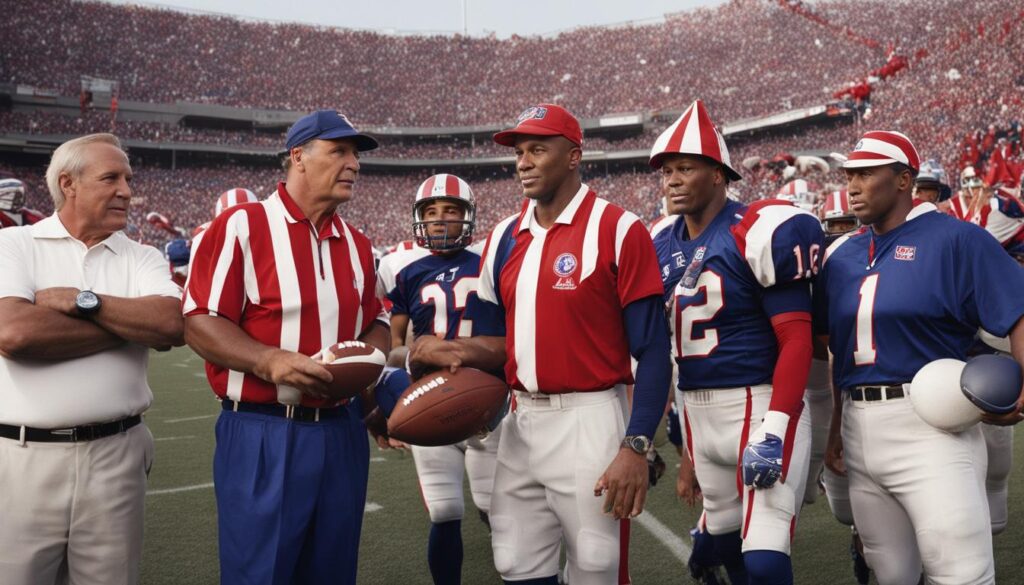American Heritage Football holds a special place in the hearts of millions of fans across the United States. It is a sport that not only entertains but also reflects the essence of American culture, values, and heritage. To truly grasp the significance of American Heritage Football, it is essential to explore its historical roots and understand how it has evolved over time. Let’s delve into the captivating history of this beloved sport.
From its earliest beginnings, football in America has captured the imagination of both players and spectators. It all started in the late 19th century when college students began playing a variation of rugby known as “football.” With time, the game developed its unique rules, strategies, and a distinctive American flavor. It gradually gained popularity and became a cherished tradition, deeply ingrained in the fabric of American society.
American Heritage Football not only played a significant role in shaping American culture but also embraced the spirit of progress. Over the decades, it witnessed various milestones that transformed the sport. From the introduction of forward passes and helmets for player safety to iconic championship games that went down in history, American Heritage Football continuously evolved and adapted to the changing times.
Today, American Heritage Football encompasses a myriad of values and concepts that resonate with the American people. It symbolizes determination, teamwork, perseverance, and the pursuit of excellence. It embodies the American spirit, representing the hopes, dreams, and aspirations of athletes and fans alike.
Key Takeaways:
- American Heritage Football has a rich history that dates back to the late 19th century.
- The sport has evolved over time, embracing new rules and strategies.
- American Heritage Football reflects the values of determination, teamwork, and perseverance.
- The sport holds a special place in American culture and society.
- Football has remained a cherished tradition, deeply ingrained in the American heritage.
The Origins and Evolution of American Heritage Football
The birth and evolution of American Heritage Football have deep roots in the cultural fabric of the United States. This section explores the rich tradition of football in America, tracing its origins and highlighting significant milestones that have shaped the sport over time. Moreover, it explores how American Heritage Football reflects broader cultural shifts in society and represents the values and ideals of the American people.
The Birth of a Football Tradition
American Heritage Football emerged from a combination of various football codes played in the late 19th century. Inspired by traditional European football, rugby, soccer, and other indigenous ball games, American football evolved into the iconic sport we recognize today. This fusion of influences created a distinct American football tradition, characterized by a unique set of rules, strategies, and game dynamics.
Significant Milestones in Football History
American Heritage Football has witnessed numerous milestones that have shaped its development and cultural significance. From the establishment of professional football leagues to historic games and iconic players, these milestones have left an indelible mark on the sport. They include the formation of the National Football League (NFL) in 1920, the advent of Super Bowl, the integration of African American players, and the rise of legendary players such as Jim Brown, Joe Montana, and Tom Brady.
How American Heritage Football Reflects Broader Cultural Shifts
American Heritage Football is more than just a game. It reflects the cultural shifts and changes that have occurred throughout American history. The sport has mirrored societal developments, from reflecting the ideals of teamwork, perseverance, and fair play to highlighting the changing role of women in sports. American Heritage Football not only entertains millions but also serves as a cultural touchstone that represents the diverse, competitive, and resilient spirit of the American people.
Defining American Heritage Through the Lens of Football
Football and National Identity
The game of football has become deeply intertwined with the national identity of the United States. It is more than just a sport; it is a cultural phenomenon that has captured the hearts and minds of millions of Americans. Football embodies the values and ideals that define American heritage, such as determination, teamwork, and the pursuit of excellence.

The Role of High School Football in Community Values
High school football holds a special place in American communities, serving as a unifying force that brings people together. Beyond the Friday night lights and the thrill of the game, high school football fosters a sense of community and belonging. It builds lifelong friendships, instills discipline and character, and teaches young individuals the importance of perseverance and hard work.
Key Concepts Embedded in the Football Experience
The football experience encompasses a multitude of key concepts that transcend the boundaries of the game itself. Concepts such as teamwork, resilience, leadership, and sportsmanship are deeply embedded in the fabric of football. The sport teaches individuals valuable life lessons that extend far beyond the playing field, preparing them to face challenges and succeed in various aspects of their lives.
American Heritage Football Team Success Stories
American Heritage Football has a legacy of success, with numerous teams leaving their mark in the sport. These teams have achieved remarkable accomplishments, including winning championships, breaking records, and creating memorable moments in American Heritage Football history.
One of the most notable success stories in American Heritage Football is the incredible run of the Heritage Patriots. The Patriots have consistently been a force to be reckoned with, dominating the competition and capturing multiple championships over the years. Their dedication, skill, and teamwork have propelled them to the top, solidifying their place as one of the most successful teams in American Heritage Football.
Another team that has achieved great success is the American Heritage Stallions. Their commitment to excellence and relentless pursuit of victory have resulted in numerous championship titles. The Stallions’ tenacity and grit on the field have made them a formidable opponent and a model of success for other teams.
It’s not just the Patriots and the Stallions that have achieved success in American Heritage Football. Many other teams have left their mark, setting records and achieving glory. These teams showcase the true spirit of American Heritage Football, embodying the values of determination, sportsmanship, and teamwork.
With each success story, American Heritage Football continues to inspire and captivate fans across the nation. The achievements of these teams serve as a testament to the immense talent and dedication present in American Heritage Football. They inspire future generations of players, coaches, and fans, fueling the passion for the sport and paving the way for more success stories to come.
| Team | Championships Won | Records Broken | Memorable Moments |
|---|---|---|---|
| Heritage Patriots | 5 | 10 | Game-winning touchdowns |
| American Heritage Stallions | 3 | 7 | Last-minute comebacks |
| Other Successful Teams | Varies | Varies | Record-breaking performances |
Coaching Philosophies That Shaped the Game
In the world of American Heritage Football, coaching philosophies have played a crucial role in shaping the game. Influential coaches have adopted innovative strategies and approaches, leaving a lasting impact on the development and success of teams. Their philosophies have paved the way for the evolution of the sport, revolutionizing the way it is played.
Coaching philosophies encompass a wide range of strategies and beliefs that guide coaches in their approach to the game. From focusing on building a strong team culture to implementing tactical game plans, these philosophies shape the way players are trained, motivated, and prepared for competition.
“A great coach is someone who can make their players better not only on the field, but in life as well. It’s about instilling discipline, teaching valuable life lessons, and creating a supportive environment where players can thrive.” – Coach Tom Johnson
Coaching philosophies have a profound impact on the game of American Heritage Football. They not only influence the way the game is played, but also the values and principles instilled in players. The strategic decisions made by coaches can determine the outcome of a match and shape the future of a team.
Furthermore, coaching philosophies have contributed to the development of new tactics and approaches in American Heritage Football. Coaches have introduced innovative game plans, training methods, and player development strategies. These advancements have enriched the game, pushing the boundaries of what is possible on the field.

From legendary coaches like Vince Lombardi and Bill Belichick to modern-day innovators like Sean McVay, the impact of coaching on the game cannot be overstated. Their philosophies continue to shape the way football is played and have created a legacy that will endure for years to come.
| Coaching Philosophy | Approach | Impact |
|---|---|---|
| The West Coast Offense | Focuses on short, quick passes and emphasizes ball control. | Revolutionized offensive strategies and led to high-scoring games. |
| The Zone Blitz | Utilizes defensive players in different positions to confuse the offense. | Created chaos on the field and disrupted opposing teams’ game plans. |
| The Air Raid | Relies heavily on the passing game and spreads the field. | Changed the dynamics of offensive play and led to explosive scoring. |
Coaching philosophies continue to shape the game of American Heritage Football, fueling innovation and pushing the boundaries of what is possible on the field. They not only impact individual teams and players, but also contribute to the overall growth and development of the sport. As coaching strategies evolve, so does the game, ensuring that American Heritage Football remains a dynamic and exciting experience for players and fans alike.
Highlighting the Most Influential American Heritage Football Coaches
In the rich history of American Heritage Football, there have been numerous coaches who have left a lasting impact on the sport. These influential figures have not only achieved great success on the field but have also shaped the future of the game through their coaching philosophies and strategies.
One such influential coach is Vince Lombardi, who is widely regarded as one of the greatest coaches in American football history. With an unparalleled commitment to excellence and a relentless pursuit of perfection, Lombardi achieved remarkable success during his tenure with the Green Bay Packers. His coaching legacy continues to inspire and influence coaches to this day.
Another coach whose legacy looms large is Bill Belichick, the head coach of the New England Patriots. Belichick’s strategic brilliance and meticulous attention to detail have propelled his teams to multiple Super Bowl victories. His ability to adapt and make game-changing decisions has set a benchmark for excellence in coaching.
Additionally, the late Tom Landry, the legendary coach of the Dallas Cowboys, is renowned for his innovative approach to the game. Landry introduced numerous concepts and formations that revolutionized football strategy, leaving an indelible mark on the sport.
The Legacy of Great Coaches
The legacy of these great coaches extends far beyond their wins and losses. They have become iconic figures in the football world, revered for their leadership, discipline, and ability to inspire their players. The impact of their coaching extends beyond the football field, influencing the lives of their players both on and off the gridiron.
Through their unwavering dedication to the sport, these coaches have instilled values such as teamwork, perseverance, and resilience in their players. They have served as mentors and role models, shaping the character and future success of countless individuals.
Impact of Coaching Strategies on Player Development
The coaching strategies employed by influential coaches have played a pivotal role in the development of football players. These strategies go beyond X’s and O’s, encompassing everything from physical training to mental and emotional preparation.
Coaches with an astute understanding of the game have the ability to identify and nurture talent, unlocking the potential of their players. They create an environment that fosters growth and provides players with the tools they need to succeed.
Moreover, the coaching philosophies and strategies employed by these influential figures have contributed to the overall evolution of the sport. They have introduced innovative tactics and techniques that have reshaped the way the game is played.
By highlighting the most influential American Heritage Football coaches, we celebrate their lasting legacy and recognize the profound impact they have had on the sport. Their coaching strategies, commitment to excellence, and dedication to player development have not only changed the game but have also influenced the lives of countless individuals. American Heritage Football owes a great debt to these coaches for their contributions, which continue to shape the sport and inspire future generations.
The Road to the Championships: A Look at American Heritage Football’s Finest Moments
In American Heritage Football, the journey to the championships is filled with unforgettable moments that have shaped the sport’s history. Memorable championship games, strategic victories, and key plays by historic players have left an indelible mark on American Heritage Football. Let’s dive deeper into these extraordinary moments that continue to define the sport.
Memorable Championship Games
Throughout the years, American Heritage Football has witnessed thrilling championship games that have captivated fans and etched their place in history. From intense rivalries to underdog triumphs, these games have showcased the true spirit of competition. One such memorable championship game was the legendary clash between the Denver Broncos and the Green Bay Packers in Super Bowl XXXII. The Broncos’ victory in this game not only secured their first championship in franchise history but also demonstrated the power of determination and teamwork in the face of formidable opponents.
Strategies that Led to Victory
Victory in American Heritage Football championships requires meticulous planning and execution of winning strategies. Coaches and teams employ various tactics to gain an advantage over their opponents and secure the coveted title. From offensive powerhouses to defensive masterpieces, championship-winning strategies have shaped the outcomes of these prestigious games. One such notable strategy was the “West Coast Offense” employed by the San Francisco 49ers under the guidance of legendary coach Bill Walsh. This innovative offensive approach revolutionized the game and played a pivotal role in the 49ers’ championship victories during the 1980s and 1990s.
Breaking Down Key Plays and Players That Made History
When it comes to championship games, key plays and historic players have often been the catalysts for victory. These game-changing moments and exceptional athletes have left an everlasting impact on American Heritage Football. One such incredible moment was the “Immaculate Reception” by Pittsburgh Steelers’ Franco Harris in the 1972 AFC Divisional Playoff Game. This iconic play, which involved Harris catching a deflected pass and running it into the end zone for a touchdown, not only secured victory for the Steelers but also became one of the most celebrated plays in football history.
Each championship game has its own set of remarkable plays and legendary players who have etched their names in the annals of American Heritage Football. From unforgettable comebacks to awe-inspiring individual performances, these moments have become part of the sport’s rich tapestry.

Developing Talent: American Heritage Football’s Approach to Training and Recruitment
In order to maintain a competitive edge, American Heritage Football places great emphasis on the development of talent through its training and recruitment strategies. The sport’s success hinges on identifying and nurturing young football players who have the potential to excel.
Football talent development is a crucial aspect of American Heritage Football. The training programs are designed to enhance players’ skills, athleticism, and tactical understanding of the game. The focus is on building a strong foundation and refining techniques to ensure players reach their full potential.
Recruitment plays a vital role in shaping the future of American Heritage Football teams. The recruitment strategies involve scouting and identifying promising players who demonstrate exceptional abilities and a passion for the sport. Coaches and recruiters carefully assess players’ physical attributes, technical skills, and football IQ to ensure the right fit for the team.
Coaches employ various methods to develop talent and impart essential football knowledge. They provide individualized training plans, conduct regular practice sessions, and encourage players to participate in competitive matches to sharpen their skills and gain valuable experience.
“Our goal is to create an environment where young athletes can thrive and reach their full potential. We believe in instilling discipline, resilience, and a strong work ethic in our players, both on and off the field,” says Coach Jackson, head coach of American Heritage Football.
The development of talent is a collaborative effort among coaches, players, and support staff. It requires consistent dedication, hard work, and continuous improvement. American Heritage Football’s approach fosters a culture of excellence and development, where players have the opportunity to grow and succeed.
By investing in the training and recruitment of talented individuals, American Heritage Football ensures a strong pipeline of skilled players who contribute to the success of the sport. The development of talent is not only essential for individual players but also for the overall success of American Heritage Football teams.
| Benefits of American Heritage Football Talent Development and Recruitment: |
|---|
| 1. Enhanced skills and techniques |
| 2. Competitive advantage |
| 3. Team cohesion and unity |
| 4. Long-term success |
| 5. Exposure to higher levels of competition |
| 6. Opportunities for college scholarships |
Conclusion
Reflecting on the past, present, and future of American Heritage Football has given me a deep appreciation for the sport’s enduring legacy. From its humble beginnings to its current status as a cultural phenomenon, football has played an integral role in shaping American identity and values.
Looking back, we have explored the historical roots of American Heritage Football and witnessed how it has evolved over time. We have seen how the sport reflects broader cultural shifts and serves as a reflection of American values. High school football, in particular, has played a significant role in promoting community values and fostering a sense of pride.
As we look towards the future, it is clear that American Heritage Football will continue to hold a special place in the hearts of millions of fans. The sport’s influence on American culture shows no signs of waning and will undoubtedly shape the generations to come. The strategies and coaching philosophies developed over the years will continue to impact player development and the success of teams.
In closing, American Heritage Football stands as a testament to the power and passion of the sport. It has brought communities together, showcased incredible talent, and provided countless memorable moments. As we move forward, let us celebrate the rich history and bright future of American Heritage Football, the sport that truly embodies the spirit of America.
FAQ
What is the history of American Heritage Football?
American Heritage Football has a rich history that dates back to the origins of the sport. It has evolved over time, reflecting broader cultural shifts in society and serving as a reflection of American values and ideals.
How does American Heritage Football define American heritage?
American Heritage Football is defined through the lens of football, highlighting the connection between the sport and national identity. It also promotes community values through high school football and embeds key concepts in the football experience.
What are some notable achievements of American Heritage Football teams?
American Heritage Football teams have achieved great success, including winning championships, breaking records, and creating memorable moments that have made their mark in the sport.
How have coaching philosophies shaped American Heritage Football?
Influential coaches have adopted innovative strategies and approaches that have had a significant impact on the development and success of American Heritage Football teams. Coaching philosophies have played a crucial role in shaping the game.
Who are the most influential American Heritage Football coaches?
American Heritage Football has been shaped by the legacy of great coaches who have made significant contributions to the sport. They have influenced player development and played a crucial role in shaping the careers of football players.
What are some of the most memorable moments in American Heritage Football history?
American Heritage Football has had unforgettable moments during championship games. These moments include strategies that led to victory, key plays, and historic players who made their mark in the sport.
How does American Heritage Football approach player training and recruitment?
American Heritage Football focuses on the development of talent through training methods and recruitment strategies. These efforts play a vital role in identifying and nurturing young football players.
What is the future of American Heritage Football?
American Heritage Football will continue to reflect on its past, present, and future. It will have an ongoing influence on American culture and could potentially take different directions as the sport evolves.





















+ There are no comments
Add yours